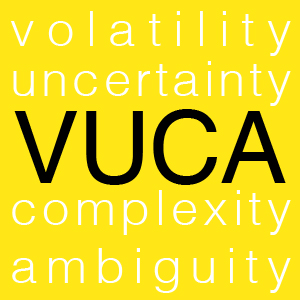 You may have heard people talking about VUCA, the challenges it poses to leadership and importantly the way we develop our current and future leaders.
You may have heard people talking about VUCA, the challenges it poses to leadership and importantly the way we develop our current and future leaders.
VUCA is described in Wikipedia as: “an acronym used to describe or reflect on the volatility, uncertainty, complexity and ambiguity of general conditions and situations. The common usage of the term VUCA began in the 1990s and derives from military vocabulary and has been subsequently used in emerging ideas in strategic leadership that apply in a wide range of organizations, including everything from for-profit corporations to the education sector.”
Quite simply it means:
VOLATILITY: the challenge is unexpected and of unknown duration – but it isn’t necessarily hard to understand.
UNCERTAINTY: despite a lack of other information the event’s basic cause and effect are unknown with change being possible but not necessarily a given.
COMPLEXITY: the situation has many interconnected parts and variables – with some information being available but the volume or nature of it can be overwhelming.
AMBIGUITY: causal relationships are completely unclear, no precedents exist – it is the unknown of the unknown!
These four factors come together in ways that either confound decisions or sharpen the capacity to look ahead, plan ahead and move ahead. VUCA, it is being said, sets the stage for managing and leading in a completely different way.
We strongly believe the traditional approaches are going to fold under this kind of pressure – status quo will no longer enable organisations to thrive and very possibly not even survive into the future.
So why does it even matter?
VUCA demands greater AGILITY from leaders – change agility, learning agility and emotional agility. In my experience resistance from existing leaders still pervades and it impacts on the decisions being executed and implemented with the necessary speed and veracity to take the business into the future in a sustainable way.
VUCA also demands greater RESILIENCE from leaders – the ability to bounce back from failure, the attitude to admit the decision was wrong and another one needs to be made in its place, the courage to admit “I don’t know” and I will find someone to work with me and research.
Put agility and resilience together and we absolutely need a good dose of vulnerability to make it all real.
This is what our leaders need to be learning about and developing – this is not intellectual (IQ), this is emotional (EQ) and it is not task oriented, it is people oriented. For this to succeed we need leaders with high levels of self actualisation.
It matters because we need far more leaders prepared to acknowledge the importance of agility, resilience and vulnerability and shift away from the heavy task orientation they have relied on to get results.
The particular meaning and relevance of VUCA often relates to how people view the conditions under which they make decisions, plan forward, manage risks, foster change and solve problems. In general, the premises of VUCA tend to shape an organization’s capacity to:
1. Anticipate the Issues that Shape Conditions
2. Understand the Consequences of Issues and Actions
3. Appreciate the Interdependence of Variables
4. Prepare for Alternative Realities and Challenges
5. Interpret and Address Relevant Opportunities
For most contemporary organizations – business, the military, education, government and others – VUCA is a practical code for awareness and readiness. Beyond the simple acronym is a body of knowledge that deals with learning models for VUCA preparedness, anticipation, evolution and intervention. [5]









